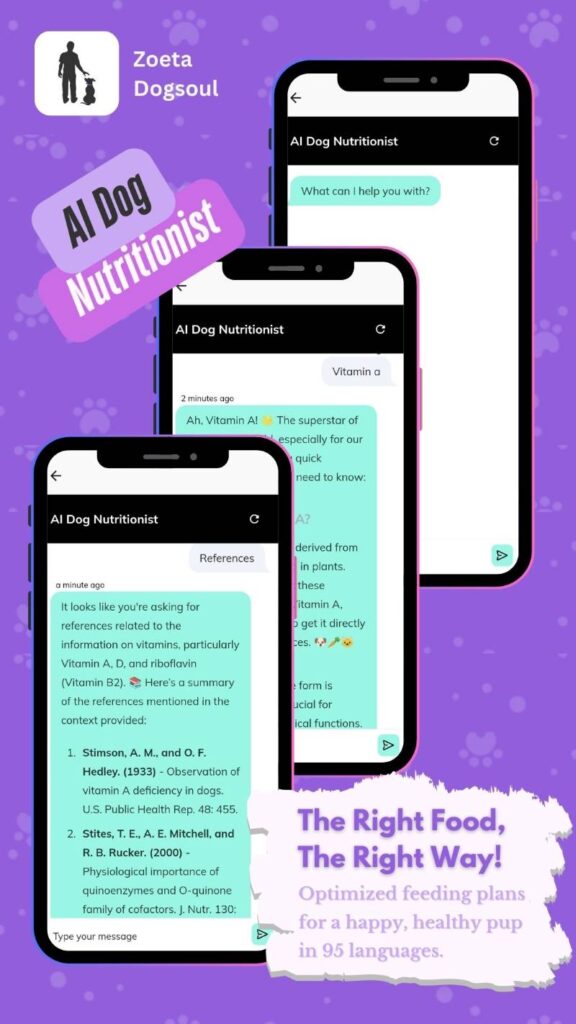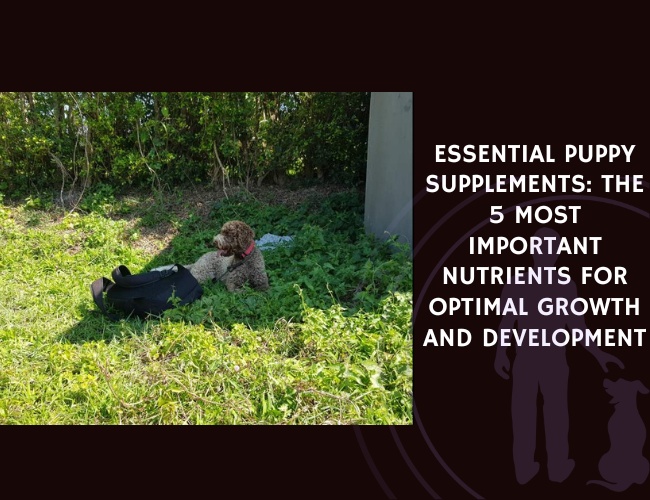Understanding Puppy Nutritional Needs
Why Puppies Need More Nutrients
Raising a healthy puppy starts with understanding how their nutritional needs differ from adult dogs. Puppies are growing fast, and this means their bodies need more energy, protein, vitamins, and minerals every day. This increase supports their developing muscles, bones, organs, and brains. For example, their need for protein to build new tissue is much higher than that of adult dogs. This professional approach helps ensure your puppy’s healthy start in life.
Special Challenges for Larger Breeds
Larger breeds, such as Labradors and Great Danes, face unique nutritional challenges. They grow quicker and reach a bigger adult size, so their energy demands can skyrocket. If they don’t get the right amount of nutrients, they’re at greater risk for deficiencies that can affect their bones, joints, or even immune systems. On the flip side, small breeds grow at a slower pace but may need more calories per kilogram to keep up with their quick metabolism. Being informative when choosing the right diet helps you support your puppy based on their breed and size.
The Role of Supplements in Puppy Diets
Even with a high-quality, balanced diet, some puppies might need an added boost. Supplements are helpful when a puppy’s diet can’t keep up with their fast-paced development or if your vet spots a specific deficiency. For instance, some nutrients aren’t always present at the levels needed for every puppy’s growth rate, which is where supportive supplements can bridge the gap. However, over-supplementation can be risky and may cause more harm than good, like imbalances that affect bone or organ development.
Bridging the Nutritional Gap
Supplements should always join a complete and balanced puppy diet, not replace it. Knowing exactly what your puppy needs and what their base diet provides is important for their safety. Professional guidance by a veterinarian is key to making sure you’re not missing any essential nutrients, but also not giving too much of a good thing.
With the right approach, you can feel supported knowing your puppy has what they need for healthy growth and development.
The Role of Supplements in Puppy Development
Supplements as Support, Not a Substitute
When it comes to helping your puppy thrive, supplementation should be informative, professional, and supportive—always enhancing, but never replacing, a balanced diet. Top-quality puppy foods that meet Association of American Feed Control Officials (AAFCO) or European Pet Food Industry Federation (FEDIAF) standards form the foundation. These diets are carefully designed to supply all the core nutrients needed for robust growth.
However, puppies—especially larger breeds—sometimes have nutritional demands that stretch beyond what even a premium diet can provide. That’s where supplements come in: they can bridge minor nutritional gaps and support development, but only when used thoughtfully.
Navigating the Risks of Overdoing It
Giving your puppy extra supplements “just in case” isn’t a wise move. Over-supplementation can actually disturb the nutritional balance, leading to health issues like bone disorders, digestive upset, or even organ stress. For example, too much calcium and phosphorus, taken on top of an already balanced diet, can cause dangerous skeletal problems, especially in fast-growing breeds like Labradors or Great Danes.
It’s essential to work closely with a veterinarian, who can offer professional advice and support. Their oversight ensures your puppy’s supplement plan is genuinely necessary and stays within safe limits.
The Importance of Balance
Supplements interact with the base diet, either boosting certain nutrients or possibly creating harmful excesses. Some nutrients, like zinc or vitamin D3, are stored in the body. Too little can result in poor growth, while too much becomes toxic. That’s why checking the nutrient levels in both your puppy’s food and any added supplements is so important. Every puppy is unique—size, age, and breed all influence nutritional needs.
A supportive, professional plan means reviewing the foods and supplements together, not in isolation. By keeping this balance, you help set the stage for steady, healthy growth—both inside and out.
Up next, we’ll introduce a nutrient that has grabbed the spotlight for supporting brainpower and learning in growing puppies.
DHA (Docosahexaenoic Acid): Brain Development Powerhouse
Why DHA Matters for Puppies
Docosahexaenoic acid (DHA) is a standout omega-3 fatty acid that’s essential for a puppy’s growing brain and nervous system. Unlike some nutrients, puppies cannot create enough DHA on their own, so they depend on their diet to get it. This makes DHA a key supplement, especially during early life.
DHA plays a direct role in the creation and function of brain cell membranes. It’s important for shaping brain structure, boosting communication between neurons, and supporting healthy learning and memory. This is why you’ll often find DHA highlighted in foods and supplements made for puppies.
Scientific Evidence: Smarter, Trainable Puppies
Research shows that puppies who get enough DHA have a real advantage. They often show quicker learning, sharper problem-solving skills, and improved trainability. This is especially critical during the early weeks of life, between 4–12 weeks, which scientists call a “critical window” for brain development. During this stage, the brain is growing fast and is highly sensitive to nutrition. By supplementing with DHA, you set the stage for better cognitive abilities as your puppy matures.
More Than Just the Brain
DHA isn’t just about boosting smarts. It is also necessary for healthy eyes and overall neurological growth. Puppies with optimal DHA levels support better vision and faster responses to their environment. Because puppies are growing so quickly, their bodies demand even more DHA than adult dogs.
During phases like weaning and socialization, when puppies face new sights, sounds, and learning tasks, getting enough DHA can make these learning experiences smoother and more effective. Remember, since puppies do not produce adequate DHA naturally, thoughtful supplementation—or picking a food that includes DHA—is informative, professional, and supportive for their development.
Providing the right nutrients at the right time lays the groundwork for lifelong health, setting puppies up for success as they continue to grow and explore the world.

Calcium & Phosphorus: Building Strong Foundations
The Dynamic Duo of Puppy Growth
Supporting your puppy’s bones and teeth starts with understanding the importance of both calcium and phosphorus. These minerals are not just added extras—they are essential building blocks working hand-in-hand for proper skeletal development. When balanced just right, they help puppies form strong bones, stable joints, and a sturdy frame to support their playful adventures.
A professional, informative look at these nutrients reveals the powerful synergy between calcium and phosphorus. Too much or too little of either can create problems, especially for bigger breeds with faster growth rates and greater nutritional demands. Large and giant breed puppies have unique needs and a greater risk of deficiency or excess. This means they’re more likely to develop skeletal conditions like osteochondrosis or hip dysplasia if the mineral ratio isn’t managed carefully.
Why the Ratio Matters
It’s not just about getting enough; it’s about the right balance. Puppies need a precise ratio of calcium to phosphorus for optimal bone growth. Imbalances—even with otherwise healthy diets—can lead to skeletal abnormalities that may affect them for life. Maintaining this equilibrium is a supportive and preventative step that keeps those growing bones on track.
A diet that meets AAFCO (Association of American Feed Control Officials) or FEDIAF (European Pet Food Industry Federation) standards typically supports healthy growth, but supplements bridge nutritional gaps when needed. Veterinary teams encourage puppy parents to be both informed and professional when considering extra supplements, since over-supplementation creates real risks.
Taking a Supportive Approach
Using calcium or phosphorus supplements should be done only under a veterinarian’s guidance. Monitoring intake—especially for fast-growing or large breeds—is a genuinely supportive practice for puppy health. Careful attention prevents over-supplementation and makes sure that both the base diet and any additions work together, not against each other.
Puppies need more than just strong bones—they also require a healthy gut for overall development.
Probiotics & Prebiotics: Gut Health Guardians
Why Gut Health Matters for Puppies
A puppy’s gut is more than just a place for food to be digested—it’s the powerhouse for their immune system and growth. During early life, a healthy intestinal system supports better absorption of essential nutrients. This is especially important because puppies grow and change so quickly. By focusing on gut health, you help set the stage for lifelong well-being in your furry friend.
How Probiotics & Prebiotics Work
Let’s break down the basics:
- Probiotics are live, beneficial bacteria. They help keep the gut environment balanced and healthy. Think of them as the “good guys” that defend against harmful bacteria.
- Prebiotics are special fibers that act as food for these beneficial bacteria. They help the “good guys” grow and thrive, making the whole system work better.
Together, probiotics and prebiotics help puppies:
- Improve digestion
- Absorb more nutrients from their food
- Develop a strong immune system
Scientific Benefits for Growing Puppies
Research shows adding probiotics and prebiotics to a puppy’s routine can have impressive benefits:
- Reduced risk of diarrhea—a common worry for puppy owners
- Better digestion and stool quality
- Enhanced immune function, which is critical as puppies explore their new world
- Specific strains, like Lactobacillus acidophilus and Bifidobacterium animalis, have shown promising results for dogs.
A healthy gut microbiome means fewer tummy troubles and a more resilient immune system, guiding your puppy through the challenges of early life in an informative and supportive way.
Tips for Safe and Professional Supplementation
Always consult a veterinarian before starting any supplement. Not every puppy needs extra probiotics or prebiotics, especially if you’re already feeding them a high-quality, complete, and balanced diet. Supplements should act as helpful allies—not replacements for good nutrition.
Choosing the right support for your puppy’s gut health ensures they develop the strong, healthy foundations needed for future growth and happiness. 😊
Supplements. Matter.
Growing puppies need more than food.
Even high-quality diets can fall short when it comes to fast-growing bones, sharp minds, and strong immunity. That’s where smart supplementation steps in.
But more isn’t better.
The wrong dose or unnecessary additions can backfire—especially in large breeds. It’s all about balance, timing, and knowing what your puppy really needs.



This guide gives clarity.
We break down the five most important supplements for puppies—and how to use them safely and effectively, with professional guidance.
Vitamin D3: The Bone Strengthener
Why Vitamin D3 Matters for Puppies
Vitamin D3 is more than just a simple nutrient for puppies—it’s a vital player in how their bones develop and grow strong. Puppies are busy growing every day, and they need all the support they can get for their bones and teeth to form properly. Vitamin D3 works by helping a puppy’s body absorb calcium, which is a building block for sturdy bones and teeth. Without enough vitamin D3, even if there’s plenty of calcium in a puppy’s diet, their bones won’t get the full benefit.
Essential Roles Beyond Bones
Supporting healthy bones is only part of what vitamin D3 does. This professional supplement is also involved in modulating, or balancing, the immune system. A well-functioning immune system helps puppies fight off common bugs and stay healthy as they explore the world. That’s why an informative look at vitamin D3 always highlights both its bone-building powers and its supportive role for overall health.
Risks of Deficiency
Let’s break down what might happen if a puppy doesn’t get enough vitamin D3:
- Bones that are weak and soft—a condition called rickets—can develop.
- Growth may be delayed, so your puppy doesn’t reach their full size as expected.
- There may be issues with teeth and overall vitality.
Being aware of these risks helps every dog owner take a more supportive and proactive approach to puppy nutrition.
Safe Supplementation
Not all puppies need extra vitamin D3, especially if their base diet already meets Association of American Feed Control Officials (AAFCO) or European Pet Food Industry Federation (FEDIAF) standards. Overdoing vitamin D3 can actually become harmful, so professional veterinary guidance is always necessary before adding any supplement. The right balance depends on each puppy’s unique needs, making an informative consultation with your vet key.
With vitamin D3 laying this strong nutritional foundation, the journey to healthy puppy growth continues—making sure every pup has what they need to thrive.
Zinc: The Multi-Functional Mineral
Why Zinc Matters for Puppies
Zinc is more than just a trace mineral—it’s a supportive player in your puppy’s healthy growth. This mineral helps over a hundred enzymes in your puppy’s body do their work. These enzymes support everything from proper development and immune system strength to creating strong, flexible skin. Zinc’s broad reach is what makes it so professionally important in puppy nutrition.
- Supports immune function by helping white blood cells fight off germs
- Essential for growth and proper development
- Helps maintain a healthy, shiny coat and tough skin barrier
- Aids in wound healing and tissue repair
A deficiency in zinc can lead to big problems. Puppies lacking zinc may struggle to grow, develop skin rashes or lesions, and have a weakened immune response. Some breeds from northern regions, like Siberian Huskies, may be more prone to zinc-related issues, so it’s especially informative to monitor their health closely.
Recognizing Zinc Deficiency
A puppy not getting enough zinc may show simple but telling signs. These can include:
- Hair loss or dull, brittle fur
- Scaly skin, blisters, or crusted areas—often around the mouth, eyes, or paws
- Poor growth or trouble gaining weight
- Getting sick more often due to reduced immune function
If you notice any of these symptoms, it’s supportive to consult a veterinary professional. They can help decide if zinc is the culprit and suggest changes that are both informative and safe.
Balancing Zinc in Your Puppy’s Diet
Zinc works best in balance with other nutrients. Most high-quality, professionally formulated puppy diets already include plenty of zinc. However, in rare cases, a supplement chosen with professional guidance may help bridge a gap.
- Too much zinc can be toxic, while too little can cause health problems.
- Always check the nutrient profile of your puppy’s food before adding a supplement.
- Rely on veterinary advice—especially if your puppy is a breed with known zinc sensitivities.
Zinc isn’t just about growth. It helps build a strong shield against environmental irritants, thanks to its contribution to a healthy dermal barrier. With the right amount of zinc, your puppy’s coat and skin will stand up stronger to the world around them.
With zinc’s impressive role covered, let’s continue exploring more nutrients that help puppies grow up healthy and strong.
Safe Supplementation Practices
Importance of Veterinary Guidance
Every puppy is unique, and their nutritional needs can vary depending on factors like breed, age, and current health. To ensure safe supplementation, involving a professional veterinarian is essential. Veterinary guidance helps prevent over-supplementation, which can sometimes cause more harm than good. Overdoing certain nutrients, such as calcium or vitamin D3, may lead to serious health issues, like skeletal disorders or vitamin toxicity. A supportive relationship with your vet ensures that your puppy receives exactly what they need, keeping their development on track in an informative and professional way.
Considering the Complete Diet
Even high-quality puppy foods are sometimes not enough to meet the exceptionally high demands of growing puppies, especially large or fast-growing breeds. Before adding any supplements, it’s very important to look closely at the puppy’s base diet. Most commercial puppy diets are formulated to meet the American Association of Feed Control Officials (AAFCO) or European Pet Food Industry Federation (FEDIAF) guidelines, providing complete nourishment. Supplements should only fill the gaps, not duplicate nutrients that are already present in the food.
Avoiding Redundancies and Adverse Effects
Supplements must be chosen with care. Using too many supplements can result in nutrient excess, which may cause imbalances or adverse effects. For example, giving extra calcium or phosphorus when it’s already present in the diet can increase the risk of bone and joint problems, especially for large breeds. Carefully reviewing both the food and supplement labels helps protect puppies from redundancy and related health issues. This informative approach keeps your puppy safe and thriving.
Breed-Specific Considerations
Different breeds have different needs. Larger breeds generally require more precise balance, particularly with minerals like calcium and phosphorus, to prevent skeletal problems. Meanwhile, some breeds may be more prone to specific nutritional deficiencies, such as zinc. By understanding your puppy’s breed profile and working alongside your veterinarian, you can make professional decisions about supplementation protocols that are best suited for your pet’s optimal growth.
Being supportive of your puppy’s health means taking every step to ensure their safety, prioritizing professional guidance, and making well-informed choices. This thoughtful approach creates a strong foundation for your puppy’s healthy journey. 😊
Conclusion: Balanced Approach to Puppy Nutrition
The power of balanced supplementation
Setting your puppy up for a healthy life starts with a thoughtful approach to nutrition. Puppies grow quickly, needing more nutrients than adult dogs to fuel their bones, brains, and immune systems. Even with a high-quality diet, the extra demands of puppyhood—especially in larger breeds—can leave room for improvement. This is where supplements can be helpful, acting as supportive tools rather than replacements.
Five key nutrients to support optimal growth
Adding the right supplements can make a big difference, but only when chosen with care. The five key nutrients most often recommended are:
- Docosahexaenoic acid (DHA): Boosts brain power, aids in problem-solving, and supports learning during important growth stages.
- Calcium & phosphorus: Support strong bones and teeth, but need to stay in balance to prevent joint problems, especially in big puppies.
- Probiotics & prebiotics: Keep your puppy’s tummy happy, help with digestion, and build a strong immune system.
- Vitamin D3: Helps calcium do its job, keeping bones sturdy and supporting healthy growth.
- Zinc: Plays a role in growth, skin, coat quality, and immune strength.
Compassionate, professional guidance matters
Every puppy is unique. Supplement needs can change based on breed, growth rate, health, and diet. That’s why it’s best to work with a veterinarian, who can offer professional advice and monitor your puppy’s developmental journey. This supportive partnership helps avoid over-supplementation, which can be just as harmful as not having enough.
Regular check-ins with your vet keep your puppy’s diet and supplement needs on track. When done thoughtfully, with informative and compassionate care, supplements become allies in helping your puppy thrive—laying the foundation for a lifetime of health and happiness! 😊










